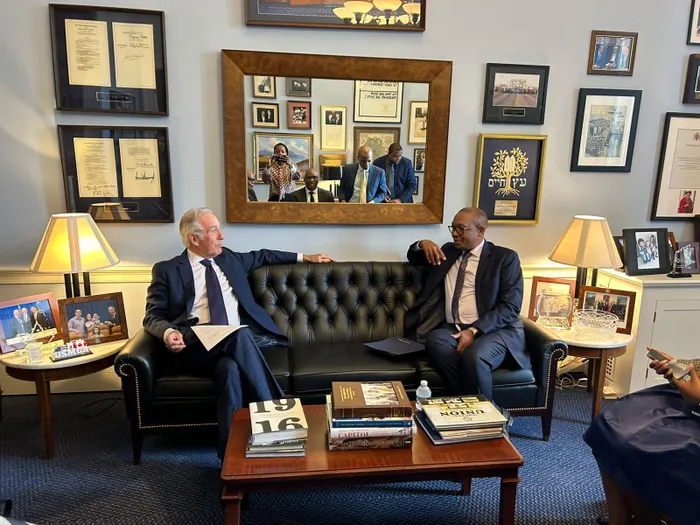
Minister of Trade, Industry and Competition, Parks Tau, also visited Rep. Richard Neal, ranking member of the House Ways and Means Committee, during his visit to Washington D.C. for a meeting with the US Trade Representative, Ambassador Jamieson Greer.
Image: Supplied
South Africa and the United States have agreed on a roadmap to strengthen bilateral trade and investment relations, despite ongoing tensions over Washington’s 30% tariff on South African exports.
The development comes amid growing concern at home over widespread job cuts across key industries that have been impacted by the US tariffs and the global trade uncertainty.
Trade, Industry and Competition Minister Parks Tau met with U.S. Trade Representative Ambassador Jamieson Greer in Washington on Friday, following three days of intensive talks between senior officials.
The meeting, initiated by President Cyril Ramaphosa, was described as cordial and constructive, with both sides committing to fast-track the resolution of priority issues.
“I will be briefing President Ramaphosa on the outcomes of the discussions and will then engage various stakeholders,” Tau said.
Ramaphosa is set to lead the South African delegation to the High-Level Segment of the 80th United Nations General Assembly (UNGA80) in New York this week.
The Presidency said he will use the platform to champion a more just, peaceful, and equitable world order, while pressing for a sustainable, inclusive, and resilient global economy that better supports developing nations.
The US is South Africa’s third-largest trading partner, following China and the European Union.
Bilateral trade between the two countries reached $15.1 billion in 2024, with South Africa exporting $8.2bn worth of goods to the US and importing $6.9bn in return.
The Office of the US Trade Representative on Friday invited public comment on foreign barriers to US exports of goods and services and US foreign direct investment for inclusion in the 2026 National Trade Estimate Report.
Greer said Trump’s America First Trade Policy was liberating American workers and businesses from unfair trade practices that have undermined the US global competitiveness and led to the largest trade deficit in goods.
“The Trump administration is working to identify and remedy trade barriers to ensure American workers, farmers, manufacturers, and service-providers can compete on a level playing field," Greer said.
More than 600 American companies currently operate in South Africa, while over 22 South African firms have a presence in the US.
Both governments expressed optimism that the newly agreed roadmap would guide future engagements and lead to tangible outcomes that strengthen economic cooperation.
However, the South African government is deeply concerned over the implications of mass job cuts on the economy following retrenchment notices by a number of multinational corporations.
Coca-Cola Beverages South Africa (CCBSA) announced last week its intention to cut approximately 680 jobs. This announcement comes at a time when a number of companies have already reduced operations, resulting in widespread job losses.
Goodyear South Africa closed the Kariega manufacturing plant and retrenched 900 employees. Ford Motor Company South Africa has indicated that more than 470 employees will lose their jobs across the Silverton assembly plant, Struandale engine plant, and administration.
ArcelorMittal South Africa plans to cut 4 000 roles, almost half of its South African workforce, including major cuts to its flagship Vanderbijlpark steel plant.
Sonja Boschoff, the chairperson of the Select Committee on Economic Development and Trade, on Friday said the pending job cuts threaten the livelihoods of thousands of South Africans.
Boshoff said this was deeply concerning, given South Africa’s stagnant economy and the country’s already exponential unemployment levels.
“Unless urgent and coordinated action is taken, the damage to our economy, communities, and industrial base will be irreversible. The stakes are high, and these job losses will push families into greater precarity, further eroding trust in our economic stability,” Boshoff said.
“It concerns the committee that small businesses, suppliers, service providers, and the informal sector are being thrown into uncertainty by these ripple effects.”
In total, the automotive industry has experienced more than 4 000 job losses over the past two years, as 12 companies in the sector have been forced to close their doors.
Boshoff said these figures underscored the urgent need for the government to arrest the industrial decline in South Africa by making the right market choices and investing in clean energy and stable power supply.
“Consumers have less spending power, municipalities have less revenue, and households are struggling. Without immediate and coordinated action, we risk a downward spiral that will be difficult to reverse,” Boshoff said.
She urged the government to convene an emergency multi-stakeholder summit with affected companies, labour unions, and provincial governments to develop concrete interventions that protect jobs, stabilise industries, and restore investor confidence.
BUSINESS REPORT